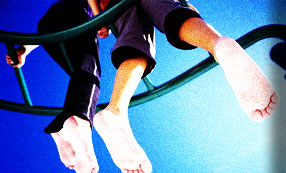Advice on Handling
Bullying and Cyber Bullying
|
What can You
do about Bullying and Cyber Bullying in your neighborhood, school, or
community?

As recent
headlines illustrate, Bullying is no longer simply a big kid pushing his weight
around on the local playground. This still happens, but we've seen that
sometimes the physical assault has been replaced by less visible, but perhaps
more damaging assault in the form of a 24 hours per day, seven days a week
online bashing. Bullies are using Instant Messaging, e-mails, chat rooms and
websites they create to humiliate others. In years past, a parent may have a
clue to their child being harassed by seeing the tell-tale physical signs of
bullying: a black eye, bloody lip, torn clothes. But the damage done by cyber
bullies is no less real, and can be infinitely more painful.
Bullying is a
behavior that people learn, and usually involves three individuals or groups:
the person who bullies, the victim, and the bystander. It is a repeated,
aggressive behavior towards one person from another person or group of
people--and it is hurtful. It might be pushing, shoving, hitting, threatening,
name-calling, shunning, lunch-stealing, and gossiping.
Why Do People Bully?
- People
bully to have power and control over others.
- People
bully because they think it makes them important, it doesn't, it just
makes them mean.
- People
bully because they think they can get what they want by bullying others.
- People
who bully do it because they have learned this from others, and may be
victims of bullying themselves.
Family Continuity is concerned about
the impact of all kinds of bullying on the families we serve, and its staff
have put together a guide that can help children, parents, school officials and
others confront this problem, and prevent or repair the damage that bullying
can do. Click herefor some
practical suggestions and ways that you can make a difference.
|
Mental Health Awareness Month
|
May is Mental Health Awareness Month and the week of May 2-8 is Children's National Mental Health Awareness Week. Family Continuity has compiled a list of resources for families and individuals to find helpful websites and other resources. Just click on this link: Resources for Families and Individuals.
|
Lowell Wraparound Activities
|

Family Continuity's Lowell Wrap-Around Program was recently given
approximately $75,000 by the Department of Mental Health as part of their Wrap
Around contract to begin non-school based activities for the Greater Lowell
Area children with mental health issues. The various activities will include
guitar and key board lessons, a poetry class, and art expression and a
photography class. It is the hope that at the end of this session there will be
a night of "Expressing Their Art" in whatever form they have chosen.
Once the session is completed individuals will have either a portfolio of their
art, perhaps a CD of their music, and most importantly a feeling of
accomplishment for what they have achieved.
In addition to these groups we will be also have a community
garden so that children and adolescents will be able to plant and utilize the fruits
of their labor. Once the vegetables and fruits ripen, a cooking class will be
taught on how to take the fresh produce and make nutritious meals for their
families to enjoy. The majority of these spring activities will be held at the Tewksbury United Methodist Church.
We will also be providing two six week family
groups to help families understand the implications of the economic issues that
face each of us today and how to budget their finances more effectively. The Lowell Wraparound
Program will have two groups: one for parents and care givers and the other for
adolescents and young adults. The exercises will provide participants in with
an understanding of how to watch their finances and what to do and what steps to
take to resolve their financial crisis.
The program also plans to provide an afternoon of giving back to the
community once a week. Although the details have not been fully planned it will
include making up small gift bags of toiletries for individuals residing at
Tewksbury State Hospital, helping out at one of the animal shelters near by and
many other possibilities. By paying it forward allows the individual to
understand that the grass is not always greener on the other side. We all need
to work together to help one another.
|
Adequate Funding Needed for CBHI
|
Can we afford not
to adequately fund the State's
Children's Behavioral Health Initiative?
This state, like so
many others, is struggling with revenue shortfalls, forcing officials to make deep cuts
in so many services that we had taken for granted only a few months ago. These
services support families, children, adults and elders, who are also struggling
with the effects of the economy the most. Children's services are in the midst
of one of the most profound transitions in memory, with costs being cut, but
also shifted, from State agencies to Medicaid supported insurance through
MassHealth and the Children's Behavioral Health Initiative. If you want to know
more about some of the challenges, risks and opportunities that this shift will
bring, Click here.
We believe that, even in difficult
times, shortchanging children is a risk not worth taking.
|
|
Tool Box |
The Massachusetts Commission for Grandparents Raising Grandchildren has compiled a great guide to assist in finding local resources. It can be found on the mass.gov web site at the following link Grandparents Resource Guide. |
|
Wish List
|
|
Below are a few items that our programs are currently in need of at this time. If you are able to donate any of the following, please contact
Kevin Nicastro at knicastro@familycontinuity.org.
- Living Room/Den furniture (sofas, chairs, end tables, lamps, etc.) for therapy rooms for Hyannis Clinic.
- 4 foot desks for Hyannis Family Partner Program
- Magazines for waiting rooms in Hyannis, Plymouth, Whitinsville, Lawrence and Peabody.
We are grateful for your donations!
|
|
Real Stories | |
Real Stories are submitted by clients who want to share the success they had thanks to the support and services provided by Family Continuity.
 Antonio's Story Antonio's Story
As far back as I can remember DCF has
been a part of our lives. I recall being evicted from our family home
on numerous occasions and being bounced around from place to place. My
mother was really struggling with substance abuse and DCF finally
became our guardians. Although some things were better for us, it was
really hard because all of my siblings were not able to be together. Despite being separated we still remained close because we went through
so much together as a family.
Unfortunately, I found myself living in a DYS lock up facility when
I was fifteen. This really scared me, but I did what I needed to do
and was fortunate enough to earn an interview at Family Continuity's
SAIL Program.
Read More.
|
|
Family Continuity's Mission Statement:
Supporting family success in every community by empowering people, enhancing their strengths, and creating solutions through partnerships to achieve hope, positive change and meaningful lives.
Agency Values: Family, Community, Advocacy, Leadership, and Change Treatment Philosophy, founded on the belief that positive change is always possible:
* The most effective treatment provides a continuity of care, acknowledging that connected, relevant supportive services to clients/client families promote recovery, stability, self advocacy and permanency in the midst of changing needs.
* Therapeutic change occurs in the context of a dynamic treatment partnership between clients and helpers that is founded on choice, respect, honesty, and a shared responsibility for and participation in the development of solutions.
* Effective treatment is empowering and strength-based, recognizing that all clients possess resources for change and that change is possible when these resources are utilized.
* Creating meaningful lives starts with identifying goals and connecting that to individualized, flexible and creative treatment planning that incorporates a client's family/community relationships, culture, and context. |
|
|

E-mail us and let us know you want to be on the list today! Please forward this to others and encourage them to sign up! Click the above box.
| |
|